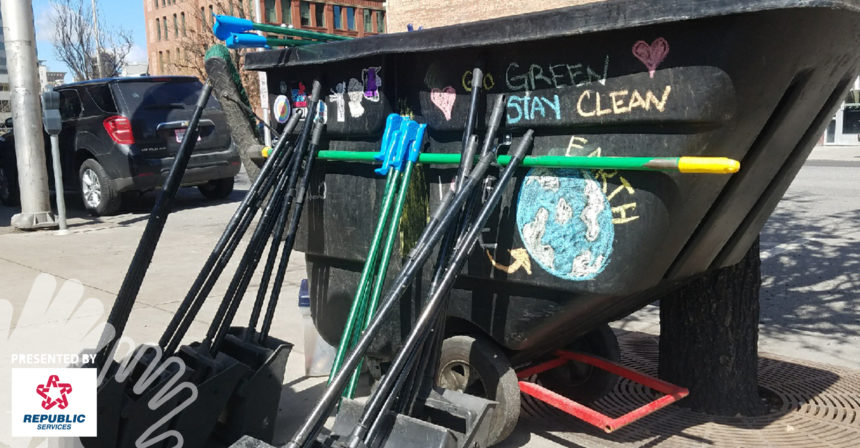Litter costs you whether you realize it or not. If you litter, you are paying for it…and so are the rest of us.
Litter clean-up costs in the United States total more than $11.5 billion each year. Most of this burden is taken care of by businesses, who annually fork over $9.1 billion to keep their properties clean. Of the remaining costs, $1.3 billion is covered by states, cities and counties and educational institutions spend approximately $241 million annually for litter abatement.
But why is this even still a thing? Ad campaigns, fines, public shaming and educational efforts have been implemented for a half century to help get the word out about something we already know, littering is bad.
Too fast too furious
The most common object found during litter clean-up is fast food litter. In a time when “busy” is an understatement, sometimes fast food is the only option for the person on the go.
A 2014 Canadian study found out the 75% of respondents admitted to littering in the previous five years, and that the average number of steps an individual will take holding trash before they litter is a measly 12, not even enough to cross the street. The average distance littler is found from a trash receptacle? Sixteen.
Obviously the solution is more garbage cans, right?
Maybe…butt
Cigarette butts are the most littered item in the world, with 4.5 trillion discarded each year. About 85% of cigarette butts are littered on the ground; 37% into bushes/shrubbery, 15% into planters, and 25% on or around trash receptacles.
So close, yet so far.
Estimates on the required time for cigarette butts to break down vary, ranging from 18 months to 10 years for complete degradation, and can contaminate ground water, which could seep into aquafers or other sources for public consumption. Obviously, throwing a not-completely-extinguished cigarette butt into a container full of flammable to-go paper bags isn’t the greatest option either, so smokers are left with a disposal catch-22.
A well-appointed smoking area should take into account the dilemma and offer a safe container, preferably built out of metal and containing a water reservoir. Nifty company TerraCycle offers a free Cigarette Waste Recycling Program. Just sign up with TerraCycle, collect the waste, and ship it to them for recycling.
Someone should do something about that
Another strong contributor to littering is the prevalence of…existing litter. About 15% of littering is affected by already existing litter. Basically people who litter think that their litter wants to go and live with its litter friends.
An area heavily littered gives an impression of not being cared for, which leads others to not respect its upkeep. In addition, property experts claim that property values in visibly littered areas lose roughly 7% of value, if not greater.
That’s why organizations all across the country implement programs similar to Spokane’s Business Improvement District Clean Team to maintain the cleanliness of public areas in order to showcase community pride.
But litter is still a problem
And it probably will be until the end of time, up there with death and taxes. The good news is there are many things that individuals and businesses can do to prevent littering, and create standards and improvements that are best practices.
More garbage cans: Take a trip to Disneyland on a quiet day and there just may be more garbage cans than people. With cans located every 30 feet, someone really has to be determined to litter at Disney. Adding garbage cans to every street corner or in well trafficked areas, make it easier to lean over and pick up the piece of litter on the ground, or to travel the few extra steps to a visible litter destination.
Reduce litter-able items: We didn’t even talk about plastic water bottles. Carry a sustainable bottle with you and invest in a good tap filter. Restaurant and fast food owners can think sustainably and get creative with to-go packaging, or offer discounts when a customer brings their own container.
Treat every neighborhood like it’s your home: You know colloquialism, “Many hands make light work.” Some phrases exist for a reason…because they make sense. Treat every space you are in with respect and love, and hold those around you accountable to that respect, and we can work together to build more beautiful and welcoming communities.
Downtown Spring Clean Week is Every April the week of Earth Day
All it takes is 15 minutes a week to keep your community clean all year long. Pledge to spend 15 minutes by yourself, or with a team, cleaning up problem areas you see. Clean-up spaces around your home or place of business, or contact the Downtown Spokane office to coordinate a clean-up and receive supplies and assistance.
Spring Clean Week is presented by Republic Services
Republic Services, Inc. was incorporated in 1996 with a “can do” spirit, driving its dramatic growth and acquisitions through the years, welcoming other organizations that share its values and fiduciary discipline. Today, Republic Services, Inc. is the second largest provider of services in the domestic non-hazardous solid waste industry. Republic Services provides non-hazardous solid waste and recycling services for commercial, industrial, municipal and residential customers.

